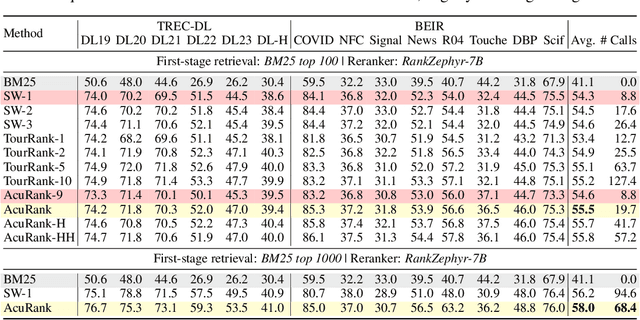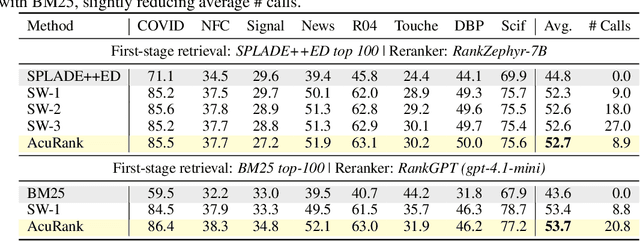Seung-won Hwang
Can David Beat Goliath? On Multi-Hop Reasoning with Resource-Constrained Agents
Jan 29, 2026Abstract:While reinforcement learning (RL) has empowered multi-turn reasoning agents with retrieval and tools, existing successes largely depend on extensive on-policy rollouts in high-cost, high-accuracy regimes. Under realistic resource constraints that cannot support large models or dense explorations, however, small language model agents fall into a low-cost, low-accuracy regime, where limited rollout budgets lead to sparse exploration, sparse credit assignment, and unstable training. In this work, we challenge this trade-off and show that small language models can achieve strong multi-hop reasoning under resource constraints. We introduce DAVID-GRPO, a budget-efficient RL framework that (i) stabilizes early learning with minimal supervision, (ii) assigns retrieval credit based on evidence recall, and (iii) improves exploration by resampling truncated near-miss trajectories. Evaluated on agents up to 1.5B parameters trained on only four RTX 3090 GPUs, DAVID-GRPO consistently outperforms prior RL methods designed for large-scale settings on six multi-hop QA benchmarks. These results show that with the right inductive biases, small agents can achieve low training cost with high accuracy.
Adaptive Retrieval for Reasoning-Intensive Retrieval
Jan 08, 2026Abstract:We study leveraging adaptive retrieval to ensure sufficient "bridge" documents are retrieved for reasoning-intensive retrieval. Bridge documents are those that contribute to the reasoning process yet are not directly relevant to the initial query. While existing reasoning-based reranker pipelines attempt to surface these documents in ranking, they suffer from bounded recall. Naive solution with adaptive retrieval into these pipelines often leads to planning error propagation. To address this, we propose REPAIR, a framework that bridges this gap by repurposing reasoning plans as dense feedback signals for adaptive retrieval. Our key distinction is enabling mid-course correction during reranking through selective adaptive retrieval, retrieving documents that support the pivotal plan. Experimental results on reasoning-intensive retrieval and complex QA tasks demonstrate that our method outperforms existing baselines by 5.6%pt.
Relevance to Utility: Process-Supervised Rewrite for RAG
Sep 19, 2025Abstract:Retrieval-Augmented Generation systems often suffer from a gap between optimizing retrieval relevance and generative utility: retrieved documents may be topically relevant but still lack the content needed for effective reasoning during generation. While existing "bridge" modules attempt to rewrite the retrieved text for better generation, we show how they fail to capture true document utility. In this work, we propose R2U, with a key distinction of directly optimizing to maximize the probability of generating a correct answer through process supervision. As such direct observation is expensive, we also propose approximating an efficient distillation pipeline by scaling the supervision from LLMs, which helps the smaller rewriter model generalize better. We evaluate our method across multiple open-domain question-answering benchmarks. The empirical results demonstrate consistent improvements over strong bridging baselines.
CoEx -- Co-evolving World-model and Exploration
Jul 29, 2025Abstract:Planning in modern LLM agents relies on the utilization of LLM as an internal world model, acquired during pretraining. However, existing agent designs fail to effectively assimilate new observations into dynamic updates of the world model. This reliance on the LLM's static internal world model is progressively prone to misalignment with the underlying true state of the world, leading to the generation of divergent and erroneous plans. We introduce a hierarchical agent architecture, CoEx, in which hierarchical state abstraction allows LLM planning to co-evolve with a dynamically updated model of the world. CoEx plans and interacts with the world by using LLM reasoning to orchestrate dynamic plans consisting of subgoals, and its learning mechanism continuously incorporates these subgoal experiences into a persistent world model in the form of a neurosymbolic belief state, comprising textual inferences and code-based symbolic memory. We evaluate our agent across a diverse set of agent scenarios involving rich environments and complex tasks including ALFWorld, PDDL, and Jericho. Our experiments show that CoEx outperforms existing agent paradigms in planning and exploration.
Chaining Event Spans for Temporal Relation Grounding
Jun 17, 2025Abstract:Accurately understanding temporal relations between events is a critical building block of diverse tasks, such as temporal reading comprehension (TRC) and relation extraction (TRE). For example in TRC, we need to understand the temporal semantic differences between the following two questions that are lexically near-identical: "What finished right before the decision?" or "What finished right after the decision?". To discern the two questions, existing solutions have relied on answer overlaps as a proxy label to contrast similar and dissimilar questions. However, we claim that answer overlap can lead to unreliable results, due to spurious overlaps of two dissimilar questions with coincidentally identical answers. To address the issue, we propose a novel approach that elicits proper reasoning behaviors through a module for predicting time spans of events. We introduce the Timeline Reasoning Network (TRN) operating in a two-step inductive reasoning process: In the first step model initially answers each question with semantic and syntactic information. The next step chains multiple questions on the same event to predict a timeline, which is then used to ground the answers. Results on the TORQUE and TB-dense, TRC and TRE tasks respectively, demonstrate that TRN outperforms previous methods by effectively resolving the spurious overlaps using the predicted timeline.
Intended Target Identification for Anomia Patients with Gradient-based Selective Augmentation
Jun 17, 2025Abstract:In this study, we investigate the potential of language models (LMs) in aiding patients experiencing anomia, a difficulty identifying the names of items. Identifying the intended target item from patient's circumlocution involves the two challenges of term failure and error: (1) The terms relevant to identifying the item remain unseen. (2) What makes the challenge unique is inherent perturbed terms by semantic paraphasia, which are not exactly related to the target item, hindering the identification process. To address each, we propose robustifying the model from semantically paraphasic errors and enhancing the model with unseen terms with gradient-based selective augmentation. Specifically, the gradient value controls augmented data quality amid semantic errors, while the gradient variance guides the inclusion of unseen but relevant terms. Due to limited domain-specific datasets, we evaluate the model on the Tip-of-the-Tongue dataset as an intermediary task and then apply our findings to real patient data from AphasiaBank. Our results demonstrate strong performance against baselines, aiding anomia patients by addressing the outlined challenges.
* EMNLP 2024 Findings (long)
ECoRAG: Evidentiality-guided Compression for Long Context RAG
Jun 06, 2025Abstract:Large Language Models (LLMs) have shown remarkable performance in Open-Domain Question Answering (ODQA) by leveraging external documents through Retrieval-Augmented Generation (RAG). To reduce RAG overhead, from longer context, context compression is necessary. However, prior compression methods do not focus on filtering out non-evidential information, which limit the performance in LLM-based RAG. We thus propose Evidentiality-guided RAG, or ECoRAG framework. ECoRAG improves LLM performance by compressing retrieved documents based on evidentiality, ensuring whether answer generation is supported by the correct evidence. As an additional step, ECoRAG reflects whether the compressed content provides sufficient evidence, and if not, retrieves more until sufficient. Experiments show that ECoRAG improves LLM performance on ODQA tasks, outperforming existing compression methods. Furthermore, ECoRAG is highly cost-efficient, as it not only reduces latency but also minimizes token usage by retaining only the necessary information to generate the correct answer. Code is available at https://github.com/ldilab/ECoRAG.
CREFT: Sequential Multi-Agent LLM for Character Relation Extraction
May 30, 2025Abstract:Understanding complex character relations is crucial for narrative analysis and efficient script evaluation, yet existing extraction methods often fail to handle long-form narratives with nuanced interactions. To address this challenge, we present CREFT, a novel sequential framework leveraging specialized Large Language Model (LLM) agents. First, CREFT builds a base character graph through knowledge distillation, then iteratively refines character composition, relation extraction, role identification, and group assignments. Experiments on a curated Korean drama dataset demonstrate that CREFT significantly outperforms single-agent LLM baselines in both accuracy and completeness. By systematically visualizing character networks, CREFT streamlines narrative comprehension and accelerates script review -- offering substantial benefits to the entertainment, publishing, and educational sectors.
From Token to Action: State Machine Reasoning to Mitigate Overthinking in Information Retrieval
May 29, 2025Abstract:Chain-of-Thought (CoT) prompting enables complex reasoning in large language models (LLMs), including applications in information retrieval (IR). However, it often leads to overthinking, where models produce excessively long and semantically redundant traces with little or no benefit. We identify two key challenges in IR: redundant trajectories that revisit similar states and misguided reasoning that diverges from user intent. To address these, we propose State Machine Reasoning (SMR), a transition-based reasoning framework composed of discrete actions (Refine, Rerank, Stop) that support early stopping and fine-grained control. Experiments on the BEIR and BRIGHT benchmarks show that SMR improves retrieval performance (nDCG@10) by 3.4% while reducing token usage by 74.4%. It generalizes across LLMs and retrievers without requiring task-specific tuning, offering a practical alternative to conventional CoT reasoning. The code and details are available at https://github.com/ldilab/SMR.
AcuRank: Uncertainty-Aware Adaptive Computation for Listwise Reranking
May 24, 2025



Abstract:Listwise reranking with large language models (LLMs) enhances top-ranked results in retrieval-based applications. Due to the limit in context size and high inference cost of long context, reranking is typically performed over a fixed size of small subsets, with the final ranking aggregated from these partial results. This fixed computation disregards query difficulty and document distribution, leading to inefficiencies. We propose AcuRank, an adaptive reranking framework that dynamically adjusts both the amount and target of computation based on uncertainty estimates over document relevance. Using a Bayesian TrueSkill model, we iteratively refine relevance estimates until reaching sufficient confidence levels, and our explicit modeling of ranking uncertainty enables principled control over reranking behavior and avoids unnecessary updates to confident predictions. Results on the TREC-DL and BEIR benchmarks show that our method consistently achieves a superior accuracy-efficiency trade-off and scales better with compute than fixed-computation baselines. These results highlight the effectiveness and generalizability of our method across diverse retrieval tasks and LLM-based reranking models.
 Add to Chrome
Add to Chrome Add to Firefox
Add to Firefox Add to Edge
Add to Edge